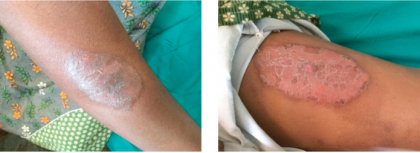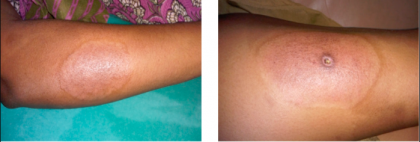- Home
- Editorial
- News
- Practice Guidelines
- Anesthesiology Guidelines
- Cancer Guidelines
- Cardiac Sciences Guidelines
- Critical Care Guidelines
- Dentistry Guidelines
- Dermatology Guidelines
- Diabetes and Endo Guidelines
- Diagnostics Guidelines
- ENT Guidelines
- Featured Practice Guidelines
- Gastroenterology Guidelines
- Geriatrics Guidelines
- Medicine Guidelines
- Nephrology Guidelines
- Neurosciences Guidelines
- Obs and Gynae Guidelines
- Ophthalmology Guidelines
- Orthopaedics Guidelines
- Paediatrics Guidelines
- Psychiatry Guidelines
- Pulmonology Guidelines
- Radiology Guidelines
- Surgery Guidelines
- Urology Guidelines
Ayurvedic regimen cured psoriasis vulgaris: Case report

Ayurvedic regimen successfully cured psoriasis vulgaris with the help of Shodhana therapy and thuvaraka rasayana, according to a case study published in the Journal of Ayurveda and Integrative medicine.
The case study showed a report of a 36-year-old woman who was diagnosed having a stable psoriasis vulgaris from last seven years. According to the study, all the symptoms observed in the beginning were found considerably reduced, and the severity also found mild following the ayurvedic regimen.
Psoriasis is a chronic skin condition caused by an overactive immune system. Symptoms include flaking, inflammation, and thick, white, silvery, or red patches of skin. Psoriasis treatments include steroid creams, occlusion, light therapy and oral medications, such as biologics which has a possible side effect. The science of Ayurveda is though to have anecdotal accounts of success in the management of psoriasis in the actual clinical practice.
The 36-year-old lady was administered with internal and external therapies along with Shodhana therapies (bio-cleansing procedures) and then followed by intake of Thuvaraka rasayana. The total duration of the treatment was 43 days and the study subject assessed before treatment, after treatment and on follow-up for improvement using PASI scoring, and histopathological study.
After the end of the study, all the symptoms observed in the beginning were considerably reduced and the severity also found mild. On the follow up it is found that the lesions were disappeared completely and the skin set back to its normal texture The PASI scoring had come down from 42 (baseline) to 0 (at the end of follow up). Considerable changes were observed in the histopathological study as well.
 Before treatment
Before treatment After treatment
After treatmentEven though psoriasis is an autoimmune disease where recurrence rate is found more, the Shodhana therapy and Thuvaraka rasayana have a definite role, the authors wrote.
For further reference, click on the link
https://doi.org/10.1016/j.jaim.2018.04.003

Disclaimer: This site is primarily intended for healthcare professionals. Any content/information on this website does not replace the advice of medical and/or health professionals and should not be construed as medical/diagnostic advice/endorsement or prescription. Use of this site is subject to our terms of use, privacy policy, advertisement policy. © 2020 Minerva Medical Treatment Pvt Ltd